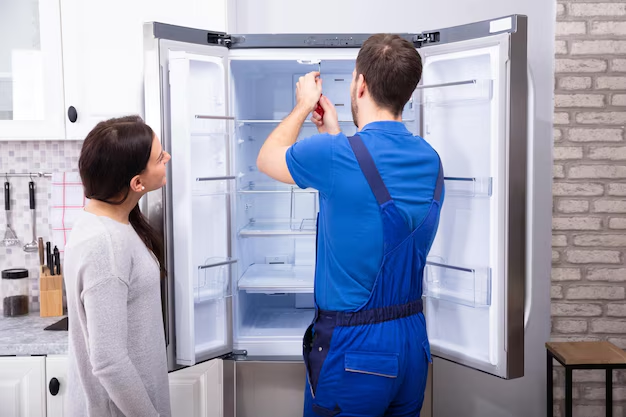Understanding Refrigerator Functionality: Should Your Fridge Run Continuously?
If you've ever paused to wonder, "Should my refrigerator be running all the time?" you're not alone. Many homeowners share this curiosity, especially when they notice the gentle hum of their refrigerator more often than not. Understanding the normal operational patterns of your refrigerator not only calms these concerns but also helps you ensure your appliance is functioning efficiently. Let's dive deep into whether a refrigerator should run continuously and explore related nuances.
The Heartbeat of Your Kitchen: Why Refrigerators Run
Refrigerators are designed to keep your food at the perfect temperature, preserving freshness and preventing spoilage. This process involves a series of cooling cycles governed by the compressor. Much like the beating heart of your fridge, the compressor plays a crucial role in maintaining the internal climate. But does this mean it should run non-stop?
Cooling Cycles Explained
A typical refrigerator operates via cycles. When the temperature inside rises above the desired level, the thermostat triggers the compressor to kick in, cooling the interior. Once the optimal temperature is reached, the compressor shuts off, allowing the refrigerator to rest. This cycle repeats several times a day.
Factors Influencing Run Time
- Room Temperature: A refrigerator may run longer in a warm environment.
- Door Openings: Frequent door openings let warm air in, prompting more cooling cycles.
- Stock Levels: An overfilled fridge struggles with air circulation and may run more.
- Model Efficiency: Newer models are often more energy-efficient and smarter in their cooling strategies.
Debunking the Myth: Continuous Running Equals a Problem
It's a common misconception that a constantly running refrigerator signals a problem. However, in many cases, it's simply a sign of the appliance doing its job. Below, we explore scenarios where continuous operation is normal and where it might warrant attention.
When It's Normal
- Warm Ambient Conditions: Summertime or poorly ventilated kitchens naturally increase the fridge's workload.
- Frequent Use: During holidays or gatherings, when the fridge is opened often, running time may increase.
- Modern Technologies: Some contemporary models feature inverter technology that allows compressors to operate at variable speeds, minimizing shutdowns to enhance efficiency.
Indications of a Potential Problem
- Ineffective Cooling: If temperatures within remain higher than optimal despite constant running, it might be necessary to call a technician.
- Excessive Noise: Loud or unusual sounds can be an indicator of a mechanical issue.
- High Energy Bills: A sudden spike could suggest inefficiency, requiring inspection.
Tips for Optimal Refrigerator Performance
Maintaining your refrigerator can prevent unnecessary cycles and wear. Here are some practical tips:
- Position Properly: Keep your fridge away from heat-producing appliances and out of direct sunlight.
- Ventilation: Ensure there's adequate space around the appliance, particularly the back, for ventilation.
- Temperature Settings: Set the thermostat to the manufacturer-recommended levels, usually around 37°F (3°C) for refrigerators and 0°F (-18°C) for freezers.
- Regular Cleaning: Dust and debris on condenser coils can hinder efficiency. Consider a coil cleaning every six months.
- Door Seals: Inspect and replace damaged gaskets to prevent air leaks that strain the compressor.
Understanding Modern Refrigerator Innovations
As technology advances, refrigerators evolve in both functionality and energy efficiency. Familiarizing yourself with new features can help you make informed choices and optimize current usage.
Energy-Saving Technologies
Inverter Compressors
This modern feature adapts the compressor's speed based on the cooling demand rather than stopping and starting, which can lead to energy savings and quieter operation.
Smart Refrigerators
These appliances connect to smart home systems, allowing you to monitor and adjust settings, even remotely. Alerts can notify you if temperatures vary, direct you to potential issues, such as ajar doors, and sometimes even diagnose problems.
Key Takeaways for Refrigerator Care and Efficiency
Here's a quick-reference guide to ensure your refrigerator runs smoothly and efficiently:
- 🌡️ Maintain Ideal Temperatures: Keep settings around 37°F (3°C) for fridges and 0°F (-18°C) for freezers.
- 💤 Allow Rest: For non-inverter models, allow the fridge to rest between cycles by minimizing door openings.
- 🔌 Optimize Energy Use: Use energy-efficient features and ensure good ventilation.
- 🧹 Regular Maintenance: Clean coils and check seals for efficient operation.
- 🌿 Stay Updated: Consider modern innovations like smart technology and inverter compressors for long-term energy savings.
Finding the Balance: When to Seek Help
While it's normal for refrigerators to run frequently, especially under certain conditions, there are times when professional help is warranted.
Signs It’s Time to Call a Professional
- Consistent Inefficiency: If your fridge consistently fails to maintain set temperatures despite self-troubleshooting.
- Physical Damage: Any signs of damage to the appliance, including broken seals or unusual frost build-up.
- Persistent Noise: While some hum is normal, persistent or loud noises aren’t.
In armed with this understanding of refrigerator operations, you can feel both confident in your appliance's performance and prepared to handle any issues that arise effectively. Remember, a refrigerator in prime condition not only supports its longevity but also ensures your household runs smoothly and efficiently.

